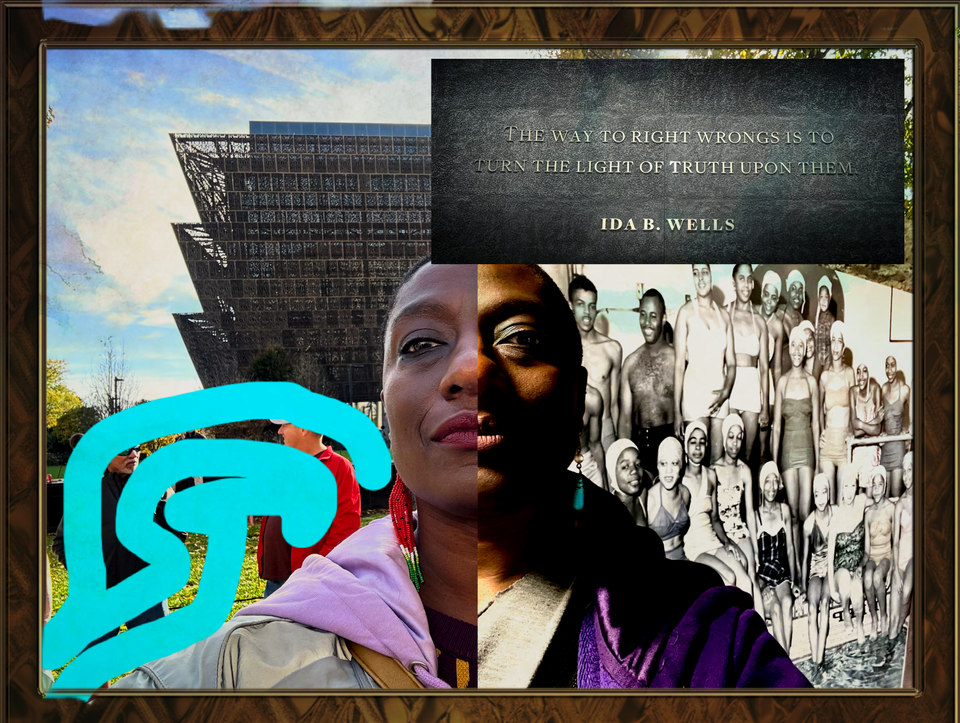Reclaiming the Water: Revisited

IF YOU APPRECIATE the creative work Atena is doing, you might be interested in helping her make it to Senegal 🇸🇳 for her (sooner than originally expected) writing retreat? You can find her fundraiser here: https://gofund.me/7a622444
“I am working on a book of narrative verse and poetic prose that explores histories of how aquatic culture has been stolen from Black people in the U.S. branches of the Diaspora, including some history and speculative poetics to conjure healing along the lineages and waterways where these harms have taken place.” — Atena O. Danner
[Image description: Collage portrait of the artist: 2 halves of 2 photos of Atena combine in the center to form her whole face with an Ida B. Wells quote above. In the left half she stands outside with the Smithsonian National Museum of African American History in the background, wearing a watermelon earring and a lavender, satin-lined hoodie; in the right half she stands in front of a black and white photo of a group of Black swimmer around a pool, circa 1960s; she’s wearing a turquoise earring and a dark purple satin line hoodie; in both photos her head is tilted slightly upward with a hint of a smile; in the upper right corner, a photo of an Ida B. Wells quote from the museum reads: “ The way to right wrongs is to turn the light of truth upon them.”]
So much has shifted since I wrote this two years ago; I figured this is a good time for an update.
When I started working on my current manuscript, I was very focused on telling stories of how Black people’s ability to swim was another casualty of stolen labor and stolen wealth. Since then, I realized how much more there is to know and tell: ways that we relate to the element personally, socially and historically. For example, there is a phenomenon called ‘Blue Mind,’ which refers to the physical, psychological and spiritual benefits of being in and around water. I learned the term from the book ‘Blue Mind’ by Dr. Wallace J. Nichols, a marine biologist who dedicated his life to promoting human and ecological wellness by promoting healthy relationships with healthy water. (I have read the book multiple times, and it has proven invaluable to my current project. RIP Dr. Nichols, and thank you.)
Now, if you are able, I want you to pause reading this and go search the hashtag #BlueMind on the social media of your choice and observe: who do you see benefitting from Blue Mind? What do they have in common? And why? My studies over the past two years have answered these questions in ways I’d never imagined.
I have learned amazing things about my personal history and the aquatic ethnographies of Black folks: some inspiring and some grotesque!
- I took proper swim lessons and learned to trust my own Black body in a way I was never able to before.
- I have learned heartbreaking facts about exactly what white people have sacrificed to maintain the delusion of racial superiority.
- I have learned about the painful complexities of how oppressed people learn to subjugate ourselves and others.
What has sustained me is the stories of resistance to oppression and our insistence on getting to the water in spite of the barriers. Much respect and gratitude to our ancestors and elders who used water as a path to freedom literally and figuratively; they have been powerful guides on this journey. (OMG - wait ‘til you see this bibliography…!)
There is actually a wave of work being produced by creatives and academics that has been too prevalent to be a coincidence. Dr. Kevin Dawson, author of ‘Undercurrents of Power’ introduced me to the term ‘Blue Humanities,’ which involves people across disciplines researching and telling water stories. Among the poets I know, people doing this work are called Water Spirits. I am proud to be among them. 🩵🌊🧜🏾
For more about the origin story of this book I’m writing, and perspective on how it has evolved, I invite you to check out this linked post from the early days of this project that I’ve come to refer to as ‘Black Lives Water.’
💖, Atena

Member discussion